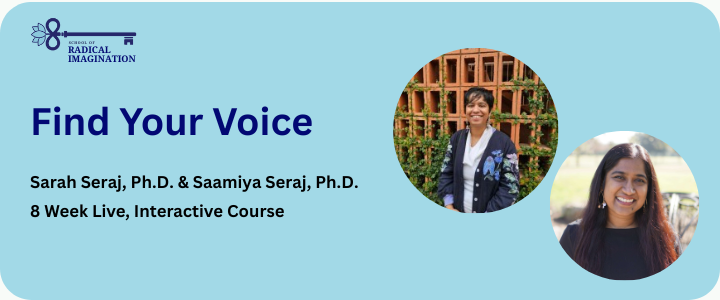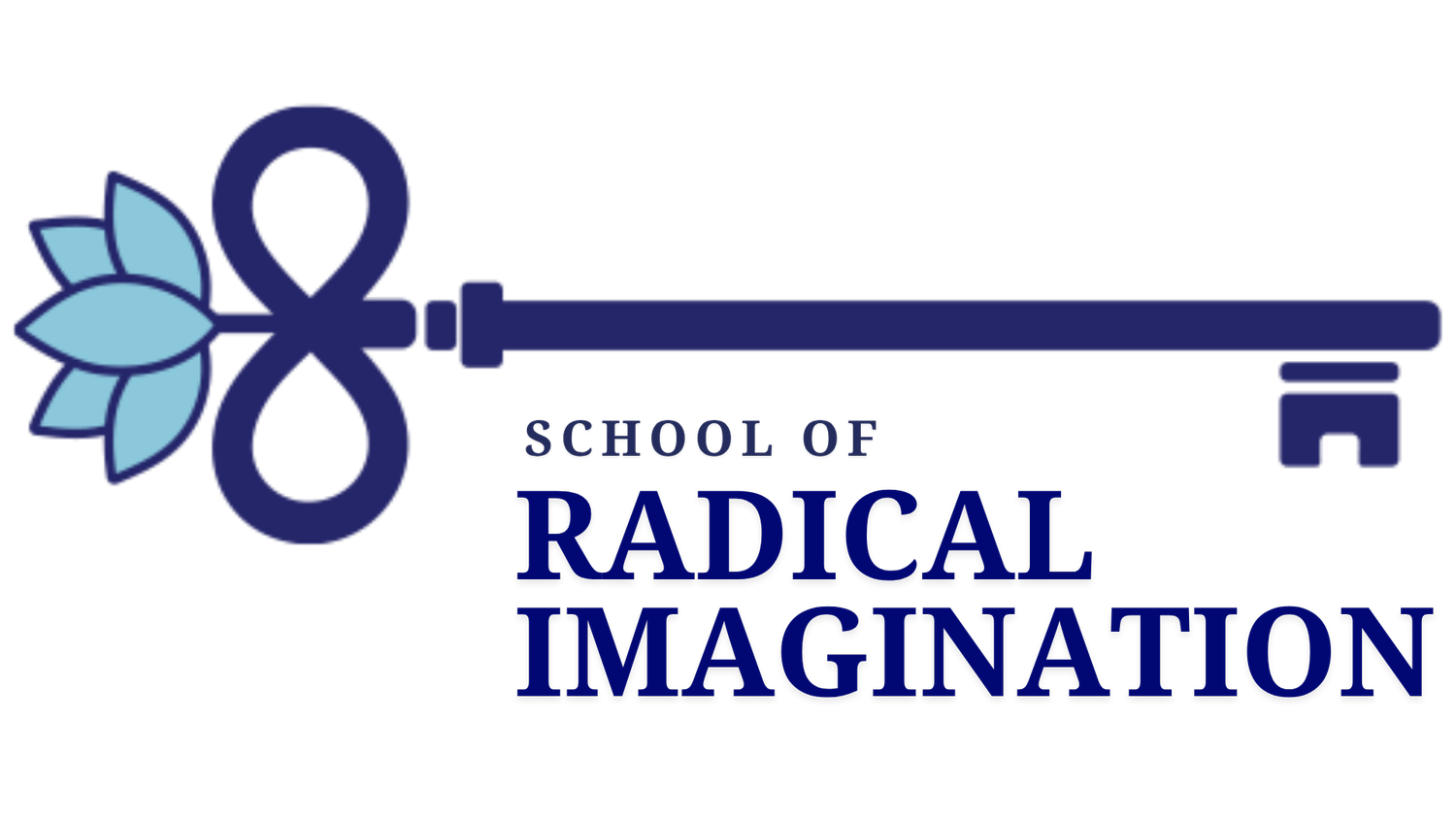Live, cohort-based courses taught by academics and practitioners.
Rooted in real-world application, community connection, and transformative learning.

The Imperial Optic
This course is about intentionally studying US imperialism in our everyday lives. It has been said that twenty-first century US imperialism evades detection, and critique, precisely because it appears diffuse and lacks a linear narrative. However research reveals that the “invisibilization” of US empire in everyday life is based on state and non-state propaganda. In this class, we focus on pulling back the layers through deep readings, films, podcasts, and critical discussion. Students will analyze their everyday lives to consider how they might extricate themselves from US empire and its violence.
Meet the Instructor: Dr. Mariam Durrani is Professorial Lecturer and Director of Graduate Studies in the Department of Peace, Human Rights, and Cultural Relations at American University. She is an interdisciplinary anthropologist whose scholarship and teaching focuses on global racialization, language, migration, education, and food studies. Based on over 20 years of writing and teaching about Islamophobia, Dr. Durrani seeks to shift how academic and public discourse reckon with the racialized impact of global wars for Muslim youth in the US and Pakistan through multi-sited ethnography and multimodal methods.

The Cyberpsychology of AI Creativity
This course explores the evolving relationship between human imagination and machine-generated creativity in the age of artificial intelligence. Starting with a psychological and philosophical grounding in human creativity and imagination, students will journey through the aesthetic, ethical, and labor dimensions of AI's impact on the creative process.

The Classroom is Burning
This course closely investigates the classroom as a space, its relationship to pedagogy and the power structures it reinforces or disrupts. How can classrooms be designed and undesigned according to the egalitarian principles of radical pedagogy? How can we create spaces that truly respond to the knowledge and experiences of their users?
Meet the Instructor: Saja Amro is an architect, educator, and designer based between The Netherlands and Palestine. Her work investigates the influence of spatial design on social dynamics in education. In her practice, she disrupts traditional classroom structures, aiming to rebuild them on the principles of radical pedagogy. As a tutor at the Architecture Department of the Gerrit Rietveld Academie, Saja uses the classroom as a place to collaborate with her students and reimagine spaces inspired by popular education methodologies, and roots of indigenous cultures. Saja co-founded Common Ground, a collaborative artistic gastronomic project focusing on using the dining table and the kitchen as research laboratories and spaces for knowledge production and exchange.

The Art of Intentional Living
This course invites participants to embrace a more conscious and intentional way of living, grounded in sustainability, simplicity, and care for the Earth. Drawing from the zero-waste movement, indigenous wisdom, and behavioral psychology, participants will explore practical strategies to reduce environmental impact, shift daily habits, and foster deeper connections with the natural world. From slow living and chemical-free practices to effective environmental storytelling, the course offers tools to reimagine our relationship with land, community, and self—nurturing a lifestyle rooted in awareness, creativity, and collective well-being.
Meet the Instructor: Najla Abdellatif is a Swedish-Palestinian environmental advocate and founder of Zero Waste Palestine, a platform that inspires individuals across the Arab world to embrace mindful, waste-free living. With a background in Business and Economics, and advanced studies in Peace and Conflict, Environmental Psychology, Sustainability, and Environmental Leadership, she brings a rich interdisciplinary lens to her work. Through workshops, storytelling, and community engagement, Najla empowers people to reconnect with the natural world and live with greater intention. Her approach to climate work centers joy, cultural wisdom, and collective empowerment as essential pathways to environmental justice.

Find Your Voice
In this class, we unpack racial trauma, explore our identities, and find our voices in a world that often wants to silence us. We retrace history to understand how modern society upholds white supremacy and causes extensive harm to BIPOC communities. Using that knowledge, we consciously move away from white models of success, learn how to become more comfortable with our identities, and re-design our life based on the values that matter most to us. We will also learn how to leverage our power, and organize in community to usher in the systemic change we need.
Meet the Instructors: Sarah Seraj, Ph.D. is an outspoken psychologist, data-driven DEI Advisor, and the co-founder & Chief Technology Officer of A Better Force (ABF), a professional training and coaching organization that empowers individuals and companies to transform themselves through customized programs. Combining her expertise in psychology and data science with her lived experience as a woman of color and an immigrant, she aims to create more inclusive spaces for women, BIPOC, and other underrepresented groups by addressing systemic inequalities within organizations. Sarah got her PhD in Psychology from the University of Texas at Austin in 2021.
Saamiya Seraj, Ph.D. is a fierce BIPOC coach and consultant, creating anti-oppressive workplaces and communities, through her role as the co-founder and Chief Executive Officer of A Better Force (ABF), a leadership development organization. With a background in engineering, organizational development, and equity advocacy, Saamiya brings a systems-thinking approach to building more inclusive and empowering workspaces. She leverages both her technical expertise and lived experience as a South Asian Muslim immigrant, and cancer survivor to challenge the status quo in leadership development and help organizations foster lasting change.

A Personal Inquiry into the Moral and Ethical Dilemmas of the International Development Industry
What happens when doing good no longer feels good? This course is a deeply personal journey into the ethical and moral dilemmas of working in international development, as seen through nearly three decades of experience in Pakistan. Using my widely shared blog series Why I Left Development as a foundation, we’ll explore the contradictions, questions, and discomforts that arise when good intentions collide with global systems of power.
Meet the Instructor: Themrise Khan is an independent development professional and researcher with almost 30 years of practitioner and policy-based experience in international development, aid effectiveness, gender, and global migration. She has worked with a vast spectrum of multilateral and bilateral organizations, INGOs and civil society organizations primarily in Pakistan, Canada and globally. She is co-editor of the book White Saviorism in International Development. Theories, Practices and Lived Experiences and she blogs, speaks and writes actively on notions of national autonomy, North-South power imbalances in development and humanitarianism, race relations and immigrant citizenship and integration and migrant and refugee rights.
